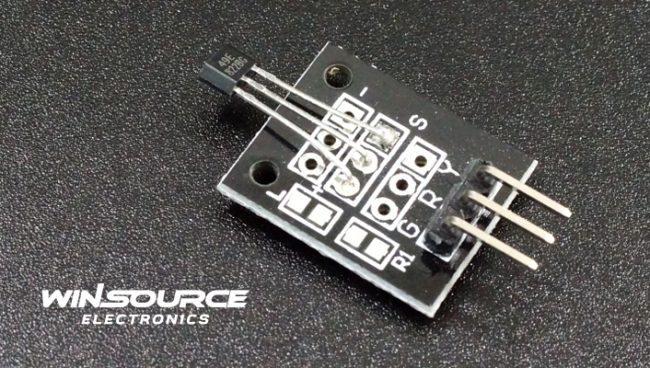
Hall sensor: revolutionizing precision in electronic sensing
Hall sensors have become an integral part of modern electronics, offering unparalleled precision in detecting magnetic fields. These sensors, based on the Hall effect principle, are crucial in a myriad of applications, from automotive to consumer electronics. Let’s discover how hall sensors work, their various uses, and the methods for testing them.
What is a hall sensor?
A hall sensor is a device that detects magnetic fields using the hall effect principle. This principle involves the generation of a voltage across an electrical conductor, transverse to an electric current in the conductor, and a magnetic field perpendicular to the current. Hall sensors are known for their accuracy in detecting the presence, strength, or direction of magnetic fields.
Their unique ability to sense magnetic fields, without direct contact, makes hall sensors invaluable in situations where physical contact is impractical or wear and tear is a concern. This non-contact detection is a key advantage in many industrial and consumer applications.
How does a hall sensor work?
The operation of a hall sensor is based on the hall-effect. When a magnetic field is perpendicular to the flow of electric charge in a conductor or semiconductor, it creates a voltage (Hall voltage) across the conductor. This voltage is proportional to the strength of the magnetic field.
Hall sensors use this principle to convert the magnetic field information into an electrical signal, which can be measured and processed. Depending on their design, hall sensors can detect static (constant) magnetic fields or changing fields. Like those found in AC electromagnets or induction coils.
Testing a hall effect sensor
Testing a hall effect sensor involves a few straightforward steps to ensure its proper functioning. To test, you need a multimeter and a known magnetic source. Start by connecting the sensor to a power supply and the multimeter. Then, bring a magnet close to the sensor and observe the multimeter reading. A functioning hall sensor will show a change in voltage when the magnet is near.
It’s important to test in both the presence and absence of a magnetic field to ensure the sensor is accurately detecting changes. Regular testing can prevent failures in applications where hall sensors play a critical role. Such as in speed sensors in vehicles or position sensing in robotics.
Magnetic field sensors in everyday applications
Magnetic field sensors, commonly known as hall effect sensors, are utilized across a wide spectrum of applications due to their reliability and precision. In the automotive sector, they play crucial roles in speed sensing, anti-lock braking systems, and position detection. In consumer electronics, hall sensors are found in smartphones for flip cover detection, in laptops for lid closure detection, and in various safety and power control systems.
Their use in industrial applications includes position sensing, current sensing, and providing safety switches in machinery. The versatility of magnetic field sensors makes them a preferred choice in these varied sectors, offering efficiency and enhancing safety.
The future of hall sensor technology
The future of hall sensor technology is bright, with ongoing advancements expanding their capabilities. Newer hall sensors are becoming more sensitive, smaller, and energy-efficient. The integration of hall sensors with IoT and smart technology is paving the way for more interactive and responsive systems.
As technology evolves, the demand for more precise and reliable sensors is increasing, and hall sensors are rising to meet these challenges. Their adaptability and precision are setting new standards in electronic sensing, making them indispensable in the future of electronics.
Innovations and future developments
The field of hall sensor technology is not just growing; it’s evolving rapidly with exciting innovations. Researchers and developers are constantly pushing the boundaries to enhance their sensitivity, reduce their size, and integrate them with emerging technologies. Upcoming developments in hall sensor technology include:
- integration with nanotechnology for even smaller sensors,
- enhanced sensitivity for more precise measurements, and
- the potential for new applications in sectors, like biomedical and environmental technology.
Another thrilling prospect is the combination of hall sensors with artificial intelligence and machine learning. This fusion could lead to smarter sensing solutions capable of adapting to changing environments and making autonomous decisions. Such advancements promise to open new horizons in robotics, automation, and smart systems. Further cementing the role of hall sensors as a cornerstone in modern electronics.
Hall sensor controller: a vital component
The hall sensor controller is an essential component in maximizing the efficiency of hall sensors. It processes the signal from the sensor, making it suitable for use in control systems. These controllers are integral in converting the sensor’s detection into actionable data, making them vital in automation and control applications.
In applications like motor control, the hall sensor controller plays a crucial role in precision and safety. It ensures the accurate functioning of hall sensors, thereby enhancing the overall efficiency and reliability of the system.
WIN SOURCE: your destination for advanced hall sensors
At WIN SOURCE, we understand the importance of precise and reliable sensors in modern electronics. That’s why we offer an extensive range of hall sensors, catering to various applications. Whether you need a basic hall effect sensor or a sophisticated hall sensor controller, we have the right solution for you.
Our commitment to quality ensures that each hall sensor in our inventory meets the highest standards, providing you with reliable and efficient components for your projects. Explore our product store to find the perfect magnetic field sensor for your needs, and experience the WIN SOURCE difference in quality and service.
© 2025 Win Source Electronics. All rights reserved. This content is protected by copyright and may not be reproduced, distributed, transmitted, cached or otherwise used, except with the prior written permission of Win Source Electronics.

COMMENTS